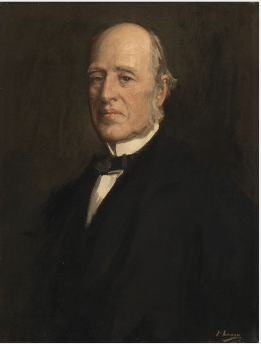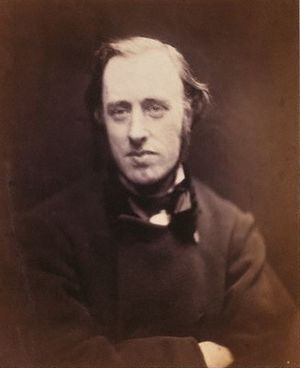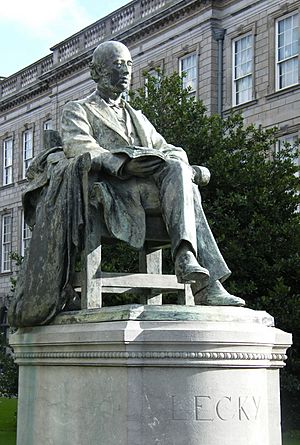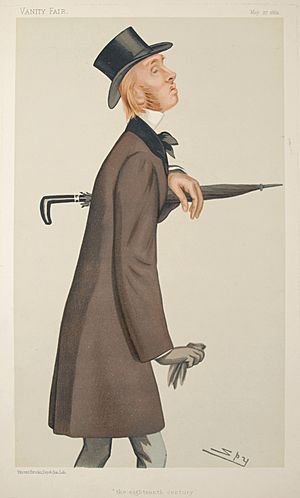William Edward Hartpole Lecky facts for kids
Quick facts for kids
William Edward Hartpole Lecky
|
|
|---|---|
 |
|
| Member of the British Parliament for Dublin University |
|
| In office 1895–1903 |
|
| Personal details | |
| Born | 26 March 1838 Newtown Park |
| Died | 22 October 1903 |
| Spouse | Elizabeth van Dedem |
| Alma mater | Trinity College Dublin |
| Occupation | historian and author |
William Edward Hartpole Lecky (born March 26, 1838 – died October 22, 1903) was an Irish historian, writer, and political thinker. He was known for his detailed studies of history. His most famous work was an eight-volume book called History of England during the Eighteenth Century.
Contents
Early Life and Education
William Lecky was born in Newtown Park, near Dublin, Ireland. He was the oldest son of John Hartpole Lecky, who owned land.
He went to school in Kingstown and Armagh, and then to Cheltenham College. Later, he studied at Trinity College Dublin. He earned his first degree in 1859 and a master's degree in 1863. He also studied divinity, planning to become a priest in the Church of Ireland.
Career as a Historian and Writer
In 1860, Lecky published a small book called The Religious Tendencies of the Age. After college, he decided to focus on writing history. In 1861, he published Leaders of Public Opinion in Ireland. This book had short biographies of important Irish figures like Jonathan Swift and Daniel O'Connell.
He then wrote two major historical surveys:
- A History of the Rise and Influence of Rationalism in Europe (1865): This book explored how reason and logic became more important in European thought.
- A History of European Morals from Augustus to Charlemagne (1869): This work looked at how ideas of right and wrong changed throughout European history. This book was a favorite of the famous American writer Mark Twain. It even influenced Twain's book, A Connecticut Yankee in King Arthur's Court.
Lecky then spent many years working on his biggest project, A History of England during the Eighteenth Century. The first parts came out in 1878, and the final parts were published in 1890. Later, a special edition separated out the parts about Ireland into a book called A History of Ireland in the Eighteenth Century.
In 1896, he published Democracy and Liberty. In this book, he shared his thoughts on modern democracy. His ideas caused some discussion in both the UK and the US.

His book The Map of Life (1899) discussed everyday ethical questions in a way that was easy to understand. In 1903, he updated his Leaders of Public Opinion in Ireland book.
Political Life
Lecky was not happy with how the Act of Union was passed. This act joined Ireland with Great Britain. He was also against William Ewart Gladstone's idea of Home Rule, which would have given Ireland more control over its own government.
Because of his views, Lecky joined the Liberal Unionist political party. In 1895, he was elected to the British Parliament to represent Dublin University. In 1897, he became a privy councillor, which meant he advised the King. In 1902, he received a very special award called the Order of Merit (OM) from King Edward VII.
University Honors and Recognition

William Lecky received many honorary degrees from important universities. These included degrees from Dublin, St Andrews, Glasgow, Oxford, and Cambridge. In 1894, he was chosen as a member of the Institute of France. He also wrote articles for magazines and published two of his speeches.
Family and Legacy
When Lecky was 14, his father passed away. He was then raised by his stepmother's husband, the Earl of Carnwath.
In 1871, he married Elizabeth van Dedem. She was a lady-in-waiting to the Queen of the Netherlands and also a writer and historian. They did not have any children.
After Lecky's death, people raised money to create a memorial for him. In 1904, a statue of him was placed at Trinity College, Dublin. His wife later published a book of his essays. In 1913, his wife also helped create the Lecky Chair of History at Trinity College Dublin, which is a special teaching position. In 1978, part of the college's library was named in his honor.
Lecky was elected a member of the American Antiquarian Society in 1891.
Images for kids
 | Percy Lavon Julian |
 | Katherine Johnson |
 | George Washington Carver |
 | Annie Easley |





